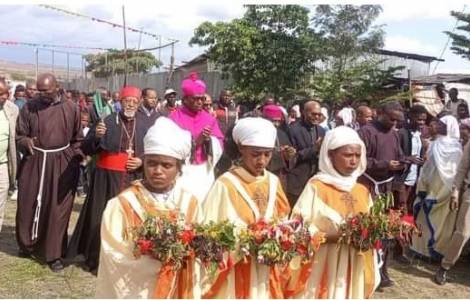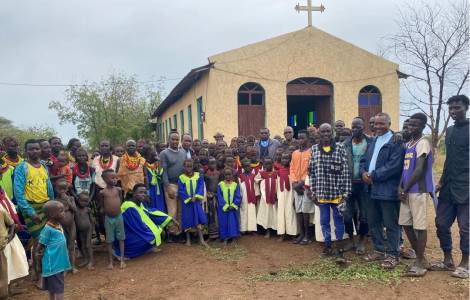
DH
by Antonella Prenna
Rome (Agenzia Fides) - “Our strength, the strength of our people, our vicariate and our diocese is faith. We have a very deep-rooted faith, people trust in God, they place their hope in God that the future holds something good for them,” said the new Apostolic Vicar of Soddo, Dejene Hidoto Gamo, O.F.M. Cap., in an interview with Fides about his priorities, his commitment and his enthusiasm after his appointment as Apostolic Vicar in his home diocese.
“The reaction to my appointment was overwhelming. When the Nuncio asked me to meet him to tell me, I was overwhelmed because I would never have expected it. God wanted me to serve in this way and so I prayed and accepted his will” – the Capuchin pointed out.
“I will celebrate my first Mass as bishop on February 9, 2025 in Dubbo at the Shrine of Our Lady of Lourdes, to which I am very attached and where I was parish priest from 2000 to 2006. Before being appointed bishop, I was pastoral coordinator for seven months. During this time, I tried to understand the context and realized that the pastoral needs of young people, 13-14 year olds, are numerous. I organized meetings with the priests to find out what the priorities are in the different parishes, only to realize that the needs are almost the same and vary according to the region."
"Our vicariate is very large and brings with it a great cultural and political commitment," continued Bishop Dejene. "We border Kenya to the south and the Jima Bonga vicariate to the southwest.
Politically, Soddo is the second largest in terms of the number of ethnic groups, with a corresponding diversity of languages and cultures and, unfortunately, a very limited number of priests to serve the entire area. In total we have only 25 priests, people ask us to open a new Catholic parish, but with this small number of priests we have great difficulties," the prelate noted, pointing out the difficulties in educational work with young people. In addition, priests are forced to travel every day to visit the various parishes, which entails high financial costs. "But we are not discouraged, the churches are full of young people and together with the parish priests and other priests we try to ensure that more and more vocations can flourish."
"The Catholic Church is very appreciated, the esteem and affection that surrounds us is enormous, people are grateful for the social activities we carry out in the various areas," continued the Apostolic Vicar, "The political authorities respect us, as do the various faith communities, because we promote peace. In fact, we are known for our peaceful coexistence with other religions. Whenever there is a small conflict, people prefer to call on Catholics as witnesses to reconcile the other groups."
"As for education, the situation varies from place to place, but we maintain our commitment to schools. In Soddo and Wolayta, for example, people were not aware of the importance of sending children to school, but now almost everyone does. The situation is different in the south, near the Kenyan border, where children, especially girls, are still not encouraged to study. In some areas, most young people do not go to university, unemployment is very high, and since there are no jobs, boys emigrate. Girls mostly go to Arab countries and very often convert to the Muslim faith. Boys emigrate to Europe or other countries, and unfortunately it often happens that they die during the journey, especially in the Mediterranean," says the Apostolic Vicar.
"The total population of Ethiopia today is almost 120 million people, and we are a minority, about 2 percent. Nevertheless, we continue to work with people, firmly rooted in faith and hope," concluded the Apostolic Vicar. (AP) (Agenzia Fides, 4/12/2024)

DH